Tmall Global Brand Flagship Store Opening Guide
China is the biggest e-commerce market in the world and has the fastest e-commerce growth. The development potential of China’s e-commerce market is enormous and Alibaba is leading this growth. Data shows that as of March 2020, mobile monthly active users in China’s e-commerce market reached 846 million, an increase of 125 million over the previous year. Tmall’s fiscal year 2020 (2019.4-2020.3) financial report shows that its GMV reached 6589 billion RMB, an increase of 862 billion RMB over the previous year. More than 2,200 brands exceeded sales of 100 million RMB, and 7 brands exceeded sales of 10 billion RMB.
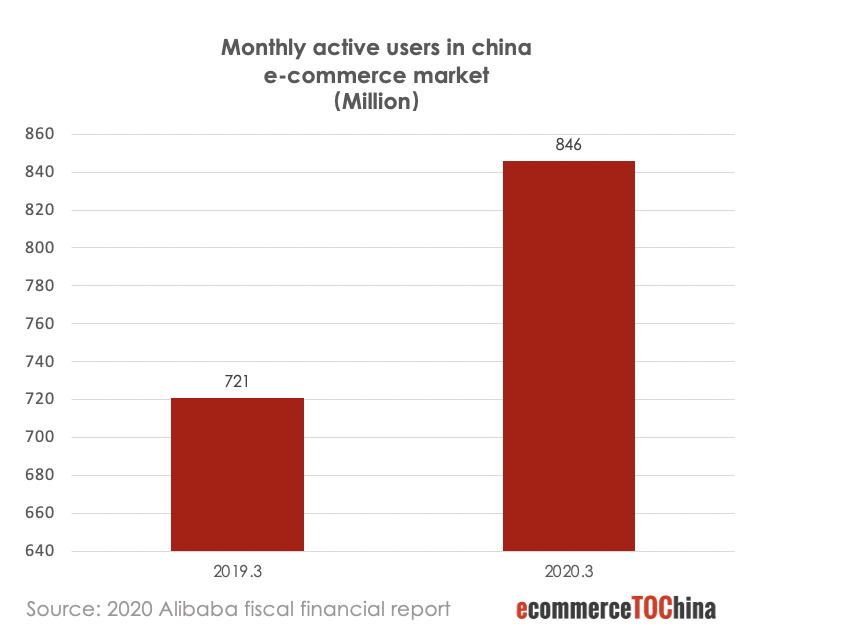
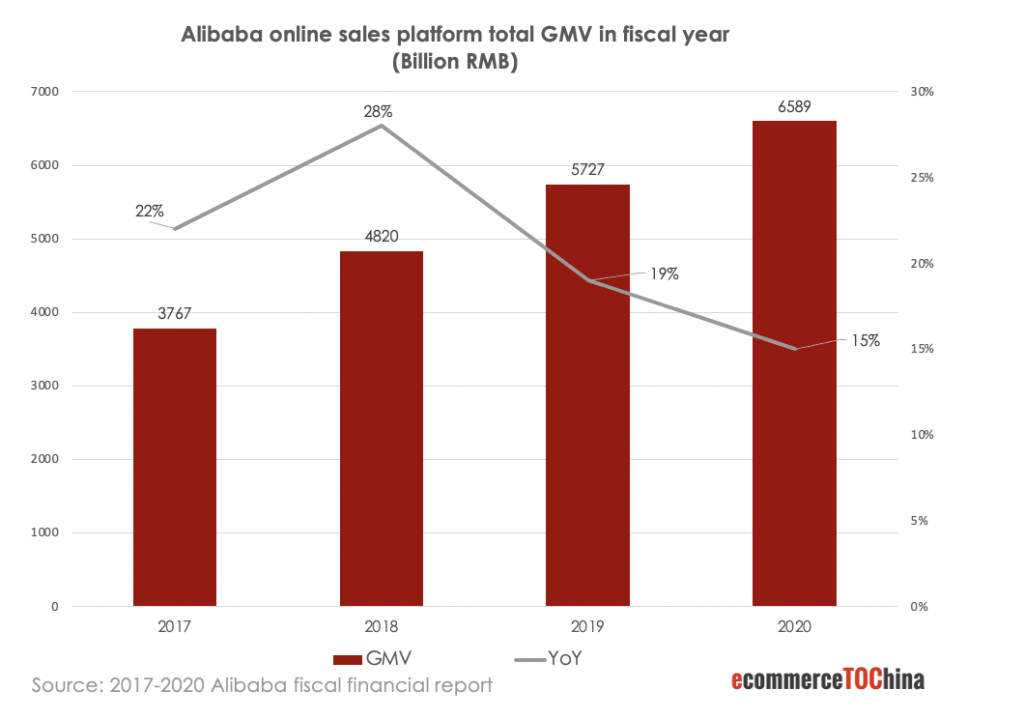
1. Alibabas B2C Platform - Tmall
Tmall is the business-to-consumer (b2c) platform of Alibaba. In April 2008, Taobao launched a spin-off of Taobao Mall, which was later renamed to Tmall.com. Tmall complemented Taobao’s C2C portal and offers business or retailers a marketplace to sell their products. In February 2014, Alibaba Group announced that Tmall Global was officially launched as a cross border e-commerce platform, providing domestic consumers with original overseas imported products.
Tmall is the largest B2C retail platform in China. Unlike Amazon, brands or retailer can not simply list single products directly in Tmall but need to first have a shop, which can list your brands. A Tmall store is essential to a global company’s china retail strategy and the most effective avenue for China market penetration. As a marketplace, Tmall provides the infrastructure to host brand owned store and access to over 800 millions shoppers.
2. Tmall vs. Tmall Global
According to Tmall official website, there are two ways to join Tmall:
- Companies with China in-country business operations can apply to Tmall
- Companies with overseas licenses are eligible for Tmall Global
Tmall Global provides an opportunity to serve the Chinese e-commerce ecosystem for international companies with no physical business in mainland China. At the very beginning, you can open a Tmall Global store for market testing. After two years testing and learning from Tmall Global, Tmall is the next destination for new international brands to enter with, as Tmall caters more mainstream consumers needs.

Below are some examples of brands entering in the Chinese market via Tmall Global and Tmall:
Tmall Global
- Brand A is eager to expand into the China market but reluctant to take on local inventory risk. Tmall Global allows brand A to enter the China market while removing this risk.
- Brand B has noticed a recent increase in overseas purchase demand for their product. Tmall Global offers brand B the opportunity to reach these consumers who are interested in imported high quality products.
- Brand C had previously thought selling finished food products directly to the China market is impossible. Tmall Global enables brand C to bring their locally famous product to Chinese shoppers.
Tmall
- Brand D has been selling offline in China for 5 years and has already built up the target market. Brand D will soon open a Tmall.com store to introduce their product to a broader audience from online.
- Brand E has been manufacturing products in China for foreign markets and would now like to try selling their branded toys to the Chinese domestic market. Brand E would open a Tmall store and utilize their local inventory for fulfillment.
- Brand F is looking to break into China’s market. They have a multipronged approach to open physical stores in mainland China and reach consumers online. With their China branch office in place, brand F is well-positioned to increase its online presence with Tmall.com
3. What is a brand flagship store?
There are different types of stores that can be opened in Tmall and Tmall Global. For international brands and retailers, the most important and relevant one is the Tmall or Tmall Global brand flagship store. You can consider a brand flagship store as a webshop, only this webshop is hosted on the marketplace Tmall.
If you are an international merchant without a Chinese legal entity, you can open up a Tmall Global Flagship Store to sell directly to the Chinese consumers.
The official definition of Tmall Global Brand Flagship store is: Stores opened by brand owners or exclusive dealers directly authorized by trademark holders on Tmall Global.
In principle, the brand flagship store can only sell goods under the corresponding brand. If the store brand is a group brand, it can sell goods under multiple brands of the group. The goods must directly come from the store brand trademark holder.
4. How to open a Tmall Global Brand Flagship Store?
4.1 Qualification of store opening enterprises
- Registration documents of the main company of the store
- Statement of the authorized representative of the main company of the store
- Identity document of the authorized representative of the main company of the store
- Overseas bank account opening certificate or bank statement of the main company of the store
- Trademark registration certificate from the brand’s birthplace
- Monopolizing authorization issued by the trademark holder (required if the main company of the store is not the trademark holder)
4.2 Tmall Global Flagship Store Opening Process
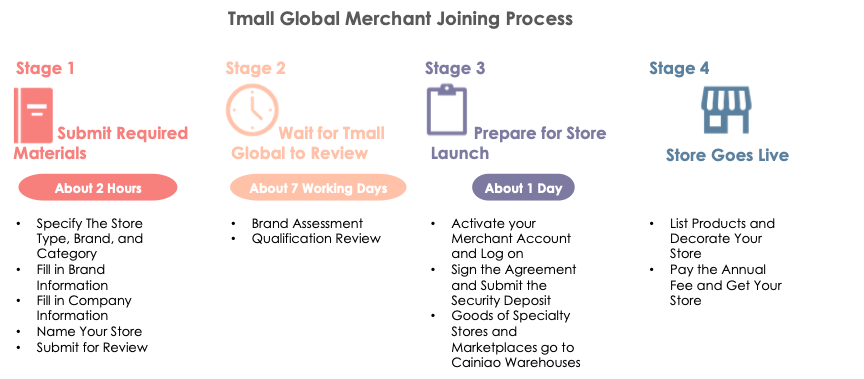
The process of applying for and setting up a store on Tmall Global is showed below:
Stage 1 - Joining Application
- Basic Requirements
Brand: Tmall Global only accepts brands registered outside China or in Hong Kong, Macao, or Taiwan.
Store Owner: The store owner must be an entity registered outside China or in Hong Kong, Macao, or Taiwan, and can provide all relevant documents that Tmall Global requires for joining. Individual store owners are not accepted.
The store owner must have an activated international Alipay account in advance.
- Prepare Application Materials
1)Check all materials required for joining. Pay attention to the requirements on the business category, store type, brand, and store owner.
2)The authorization letter must be signed by the person in charge of the authorizing company.
3)Materials in languages other than Chinese and English must be provided along with the Chinese/English translation. The translated copies must be signed by the authorized representative of the store owner.
4)Your application will be returned to you if the materials are insufficient. Therefore, we recommend that you prepare all required materials in advance to get an approval in one sitting.
- Submit The Application
1)Specify the store type, brand, and category.
2)Fill in the brand information (including brand information and self-recommendation information) and submit the corresponding qualifications.
3)Fill in the company information of the store owner and submit the corresponding qualifications.
4)Name your store in accordance with the Tmall Global store naming rules.
Stage 2 - Application Review
- Brand And Store Owner Assessment
Tmall Global will evaluate the owner and brand of the store.
2. Qualificaiton Review. Please Ensure That:
1)The qualifications are true and valid.
2)The authorization links are complete and valid.
3)The store owner is an entity company registered outside China, or in Hong Kong, Macao, or Taiwan.
4)The brand qualification includes the trademark registration certificate from the commodity brand’s country of origin.
Stage 3 - Store Information Supplement
- Activate the account, set the password and fill in basic information of the store.
- Complete the Global Alipay verification.
- Sign relevant agreements with Tmall Global.
- Submit the security deposit for your store according to Tmall Global Fee Standards. Please ensure that you have sufficient balance in your Global Alipay account.
Stage 4 - Going Live
- Good of speciality stores and marketplaces shall go to Cainiao warehouses.
- List a specified quantity of items before your store goes live.
- Decorate your store.
- Pay the annual fee and get your store online.
5. Tmall Flagship Store payment solution
You need to register an Alipay account before setup. Like Paypal, Alipay is linked with company’s bank account and the funds are sent immediately if it is requested.
6. Tmall flagship store fee structure
Deposit fee
The deposit fee required before setting up a store on Tmall Global is between $8000 and $25000, depending on your product category. And it is used to pay back customers who are not satisfied with products delivered to them if the products were counterfeit or not up to the standard advertised.
Annual Fee
This fee is paid to Tmall Global yearly for services rendered. This fee is dependent upon the merchant’s registered primary category.
Platform Commission
Tmall Global charges a commission fee based on the category of the product sold. The commission fee is calculated using the product price and the logistics cost:
Commission Fee = (Product Price + Logistics Fee) * Applicable Commission Rate
In the table below, we have listed out the different annual fees and platform commission depending on the categories:
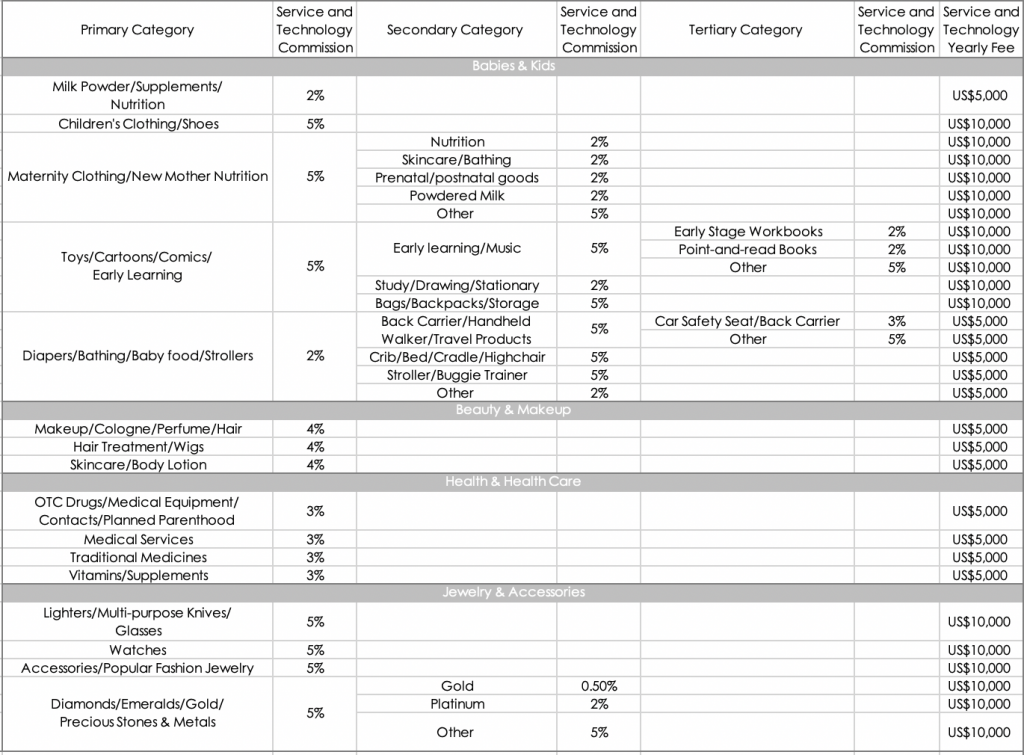
Alipay Service Fee
Alipay charges a 1% service fee, applied to each transaction via Tmall Global. The applicable transaction is the total of the product price and logistics fee:
Alipay Service Fee = (Product Price + Logistics Fee) * 1%
7. Storage and logistics
A good logistics plan is required for your Tmall Global store. There are two options, bonded warehouses or direct shipping.
For a bonded warehouse, you export your goods in bulk to a bonded warehouse in China. The goods are shipped to and stored in bonded warehouses till there is an order, then goods are transported to customers. The delivery is fast and takes lower shipping costs. However, the disadvantages are obvious that initial setup cost and the risk of low inventory turnover ratio.
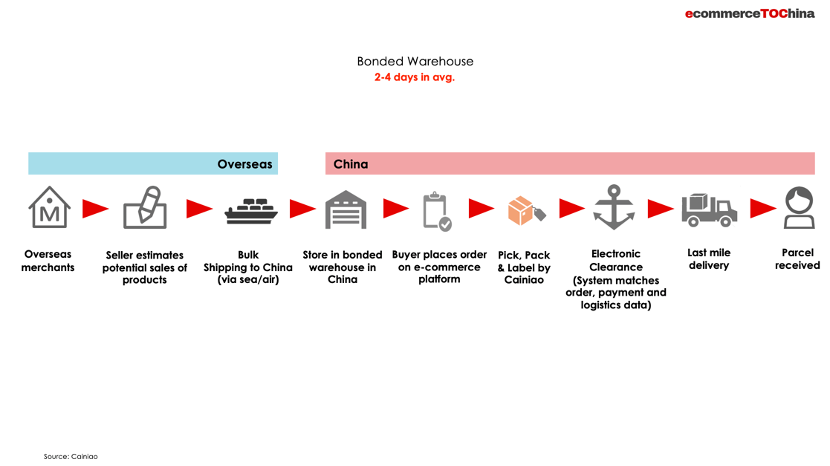
For direct shipping, the goods are shipped directly to consumers in China after orders are made. You need to cooperate with Cainiao overseas warehouse, which is a part of Alibaba Official overseas logistics. The advantages are that you don’t need upfront set up fees. The cost of delivering goods balances with your increase in sales. The disadvantages are the slower delivery speed, higher delivery cost, and delay in delivery due to customs check.
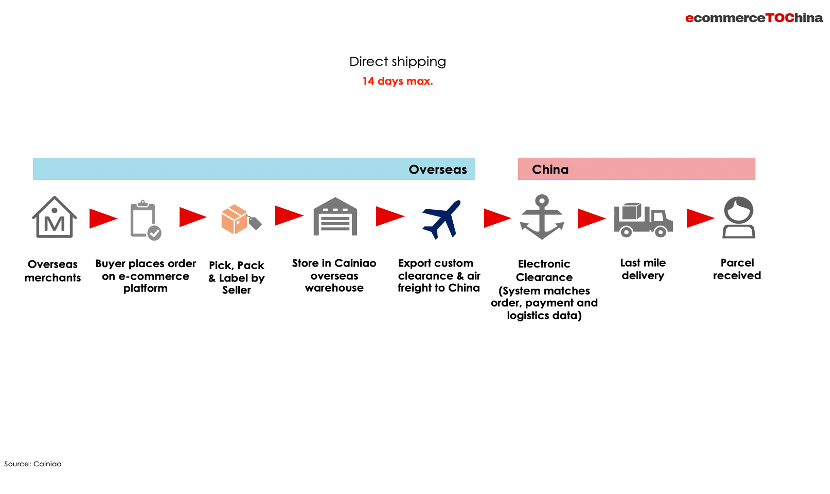
8. Shop operation partner (TP)
There is a partner role which might be new to the international brands — TP. TP is the so called Taobao or Tmall Partner which refers to the third-party companies that helps you operate your daily store or channel businesses on Alibaba’s e-commerce platforms in China. Some Tmall partners also work with other e-commerce platforms, such as JD, Kaola or VIP. Some TPs also have an offline distribution network.
Normally you need a TP to operate your brand flagship store. Your shop operations team provided by TP is responsible for everything related to daily shop operation business, e.g., creating product details pages, develop your store sales plan, execute performance marketing (e.g. paid advertising on Tmall), carry out store promotional events and e-commerce festivals such as double 11, customer services… Your shop operations team shall at least consists of 4 people: store manager, designer, customer services (before and after sales).
TP usually works at two different models: distribution model or consignment model.
For distribution model, your TP is similar to your distributor which usually purchase your products at an ex work price.
For consignment model, your TP will normally charge two fees: a fixed fee mainly used to cover the team personnel costs and a sales commission.
9. Summary
As you can tell from the process, effort and cost structure of opening a Tmall brand flagship store, this is not a simple decision which can be easily made. We suggest the international brands and retailers to conduct comprehensive research, gather enough information and make a business case before. eTOC is a great fan of the “test and approve” approach. For brands who want to first test the Chinese market and get real market feedback, we provide a “China Market Speed Test” service which enables international brands and retailers to first test its product potential with a very limited budget and gather market real data for the next “go big” solution – opening up Tmall brand flagship store.
Want to have a first free consultation session about how to sell to China via China? Contact us.
